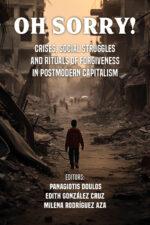Panagiotis Doulos currently works as a professor-researcher in the Programa de Investigadoras e Investigadores por México-CONAHCYT and in the Instituto de Ciencias Sociales y Humanidades “Alfonso Vélez Pliego” of the Benemérita Universidad Autónoma de Puebla, Mexico. His research interests include issues of violence, social struggles and critical theory. HE has published several articles on violence, the fetishism of the concrete and the crisis of capitalist relations.
Edith González Cruz is a postdoctoral researcher in the Program for the Formation and Consolidation of Researchers for Mexico (CONAHCYT) at the Institute of Social Sciences and Humanities “Alfonso Vélez Pliego” (BUAP). She is a member of the National System of Researchers (SNI-I). Her research interests are related to social struggles, critical theory and Latin American critical thought.
Milena Rodríguez Aza is a Colombian PhD student in Sociology at the Institute of Social Sciences and Humanities “Alfonso Vélez Pliego” of the Benemérita Universidad Autónoma de Puebla (Buap), Mexico, and Master in Sociology from the same institution. Her interests are related to the organisation and social struggle in Colombia, mainly the mingas in the southwest of the country, from the perspective of Latin American critical thinking and the critique of political economy.
-
Select options This product has multiple variants. The options may be chosen on the product page
Oh, Sorry! Rituals of Forgiveness, Crises and Social Struggles in Postmodern Capitalism
USD $ 20.00As the world grapples with the legacy of crimes of enslavement, colonialism, genocide and mass killings, imprisonment and murder of children, attempts at eliminating cultures and history of Indigenous peoples, looting and other crimes against humanity, the performance of public atonement has become increasingly prevalent. Apologies from state actors and institutions are issued in solemn ceremonies, often acknowledging the collective guilt for historical atrocities. Despite the solemnity of these events, there is a growing scepticism surrounding the sincerity of these apologies, particularly when they are not accompanied by tangible reparations, healing, reconciliation or systemic change. This scepticism is rooted in a perception that these acts of contrition are sometimes less about making amends to the aggrieved and more about assuaging the guilt of the aggressors and maintaining the status quo, providing the illusion of progress without the substance.
In this compelling work, Oh, Sorry! Rituals of Forgiveness, Crises and Social Struggles in Postmodern Capitalism, the authors unveil the complex interplay between public apologies, social justice and popular mobilisations. The chapters are devoted primarily to the experiences of Latin America, particularly of Mexico, Guatemala, Chile, and Brazil. But there is also a chapter on the struggles for Palestine — so relevant in the face of the current genocidal invasion by the Zionist State of Israel into Gaza, the world’s largest and most densely populated concentration camp.Select options This product has multiple variants. The options may be chosen on the product page


